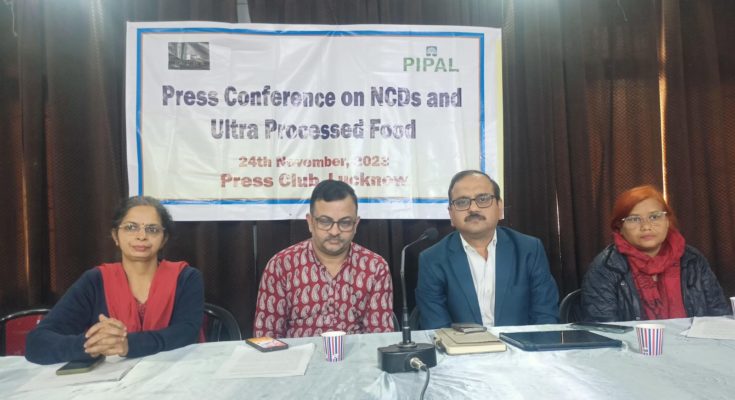The National Human Rights Commission (NHRC) expresses profound concern over the adverse health effects caused by packaged foods high in salt, sugar, and saturated fats. Recognizing it as a violation of the Right to Life and Right to Health of Indian citizens, the quasi-judicial body has called for a response from the Food Safety and Standards Authority of India (FSSAI) regarding its selection of front-of-pack labels aimed at providing consumers with information to make healthier choices.
Established in 1993 with the singular purpose of safeguarding human rights in the country, the NHRC issued this unprecedented directive in response to a complaint filed on September 14, 2021, by Ms. Shruti Nagvanshi and Ms. Shirin Shabana Khan on behalf of the Peoples’ Vigilance Committee on Human Rights (PVCHR) and Savitri Bai Phule Mahila Panchayat of Varanasi, Uttar Pradesh.
The honorable Commission issued the first notice on October 11, 2021, to The Secretary – Health & Family Welfare, Ministry of Health and Family Welfare, Govt. of India. On February 9, 2022, to The Chief Executive Officer, Food Safety and Standards Authority of India (FSSAI). On September 20, 2022, the Food Safety and Standards Authority of India (FSSAI) introduced the Front of Pack Labelling (FOPL) draft regulation, subsequently open for public comment.

Ms. Shruti Nagvanshi, co-complainant and Convenor of Savitri Bai Phule Mahila Panchayat, remarked, “Indians are witnessing a sharp rise in premature deaths and morbidity due to Non-Communicable Diseases (NCDs) such as diabetes, obesity, cancers, and cardiovascular diseases. These ailments are affecting the youth and children, sometimes as early as 5 years of age. Packaged food products with high levels of sugar, salt, or fats are a primary cause of this crisis. Unable to tolerate the harm being inflicted on consumers unknowingly, we approached the NHRC to assert that consumers have the right to know what’s in their food. A clear warning on the front-of-pack (FOPL) is the only way to protect our children and people from catastrophic health consequences. While FSSAI has introduced a draft regulation and proposed a certain type of FOPL, it is not the best choice for the people. We need a clear warning and not a misleading star-based rating system.”
In a rare move, NHRC has decided to constitute a full commission for this matter, according to Dr. Lenin Raghuvanshi, Founder and Convenor of PVCHR. He emphasized, “In the interest of public health, it would be appropriate for FSSAI to abandon the idea of a star rating. An alert or warning label is the need of the hour. For over two years now, members of the PIPAL network (People’s Initiative for Participatory Action on Food Labeling) have been advocating for the protection of a child’s right to healthy food and a healthy life. This is a significant moment for this movement, and we hope that FSSAI pays heed.”
Dr. Yuvraj Singh, commenting on FSSAI’s proposed India Nutrition Rating (INR), stated, “The notion that unhealthy food can become healthy simply by adding fruits or nuts is erroneous and lacks a scientific basis. The assignment of stars is based on a complex scoring system that values positive factors such as the inclusion of fruit or nuts. This ‘star rating’ may mask many of the detrimental effects of these products and convey a misleading message to the public.”
Expressing confidence in the full commission, Ms. Shirin Shabana Khan, Program Director of PVCHR, said, “There is enough evidence from India, including a study conducted by AIIMS, IIPS, and leading nutritionists like Dr. Chandrakant Pandav, that warning labels work best. Countries worldwide are adopting warning labels to protect their people. We should adhere to what is right and scientific.”
Ms. Nagvanshi emphasized that the journey has not been easy, with NHRC issuing reminders and notices to the Ministry of Health and FSSAI that received no responses. The notice issued now will be hard to ignore as it marks a crucial step.
Latest order of NHRC
Date: 31/05/2023
Authority: THE DIRECTOR, Ministry of Health and Family Welfare. Food Safety and Standards Authority of India, REGULATORY COMPLIANCE, 03rd and 04th Floor, FDA Bhawan, Kotla Road near Bal Bhawan New Delhi – 110002 India
Order: The instant matter pertains to a complaint received from the complainants, alleging that Non-Communicable Diseases (NCDs) are the major cause of morbidity and mortality in India. The packaged food is high in salt, fat and sugar which poses major risk factors for Obesity and NCDs. The petitioners also prayed for implementation of Nutrient Profile Model and Front of Packet Labelling (FOPL) regulation in India as it will help the food processing industry towards healthy food.
These proceedings shall be read in continuation of earlier proceedings of the Commission dated 20.07.2022.
Pursuant to the directions of the Commission, the Director, Regulatory Compliance Division, FSSAI vide a detailed letter dated 03.04.2023 has submitted that FSSAI had constituted a Consultative Group to draw consensus between the industry associations and consumer organizations on thresholds of fat, sugar and salt, as well as method of labelling to be used for Front-of-Pack Nutritional Labelling. The Consultative Group recommended to undertake a nation-wide survey for understanding consumer preferences in India and to review the categorization of foods for FOPNL. Accordingly, an MoU was signed with IIM, Ahmedabad in September, 2021 for the conduct of survey-based study on ‘Consumer perceptions of different front-of-pack labels for packaged food among Indian population’. IIM Ahmedabad presented the report of survey in the stakeholders’ meeting held on 15.02.2022, which recommended Star Rating as a model for achieving the careful combination of ease of identification and understanding and change of purchase behaviour of Indian consumers. Further, the categorisation of foods as well as thresholds for these categories was also recommended by the concerned Scientific Panel in the same meeting. Based on the decisions taken in the meeting, the recommendations made by the Scientific Panel as well as IIM, Ahmedabad have been incorporated under the FSS (Labelling and Display) Regulations, 2020 and the draft amendment notification has been published on 13.09.2022. It is further mentioned that the report dated 15.02.2022 submitted by IIM, Ahmedabad has concluded that they have conducted a first ever large scale randomized controlled trial within the complex socio-economic-demographic setting of the Indian consumers to determine which among the five Monochrome GDA, Nutri-Score, Warning Labels and Health Star Ratings (HSR)-is the easiest to understand and influences purchase intention. The results indicate that on an average the summary ratings of HSR and Warning Labels are the most preferred from the perspective of ease of identification, understanding, reliability and influence. Among the two, HSR appears more acceptable, clearly outdoing the nutrient specific formats, HSR finds greater support among the Southern, Central and Western regions of the country. MTL, was most preferred when it came to reflecting necessary health information and the presence of an unwanted nutrient, however, ranked low in other parameters. It is also observed that HSR has stronger performance on case of identification, understanding. reliability and lack of complexity specifically among the sub-populations which are of higher consequence to influencing purchases- females, individuals primarily responsible for grocery shopping, urban individuals, individuals that read labels presently, individuals who don’t read labels because they are not aware of labels as well as individuals who do not want information about good nutrients on the FOPL (73% of total sample). The report mentions about some recommendations made by IIM, Ahmedabad.
The Director, Discipline Compliance Department, FSSAI also mentioned that comments of stakeholders have been received on draft notification and are under consideration of concerned scientific panel at FSSAI.
Meanwhile, the Commission received various communications from the complainant submitting more representations in the instant case focusing on the following points:
i) As reported, India is facing a public health crisis of so-called non- communicable diseases like obesity, diabetes, hypertension, cancers, kidney and heart diseases. It is said to begin as early as 5 years of age Our thoughts go out to our near and dear ones whom we have lost early. Our thoughts go out to the future of our children.
(ii) One of the key reasons for this situation is the increased consumption of pre-packaged food products also known as ultra-processed foods. These products are such as Regular soft drinks, sport drinks, sweet biscuits, breakfast cereals, chocolate, and savory and sweet biscuits, chips etc. These are usually high in sugar/salt or fats.
(iii) FSSAI has put up a draft notification in this direction and invited public comments, which is a welcome step. A Front of package labeling of foods (FOPL) should be implemented at the earliest so that consumers can make an informed choice. It is also perceivable that vested interests might try to delay the notification due to their commercial interests.
(iv) However, The Amendment Regulation as of now may be a little misleading for the public at large as it plans to give “Stars” to junk food and call these healthy. This is even though the regulation has defined high fat, sugar, or salt foods (HFSS) as, if a product contains total sugar or saturated fat that provides more than 10% of total calories is considered High; as per WHO guidelines. These cut-offs may be used for FOPL.
(v) The concept that unhealthy food becomes healthy by adding fruits or nuts is flawed and has no basis in science. The Stars are assigned by a complex scoring system, that values positive factors such as fruit or nuts. This ‘star rating’ might mask many deleterious effects of these products and might convey the wrong message to the public.
(vi) In the best interest of public health, it would be appropriate for the FSSAI to inform people about which foods are high in food risk factors going by its definition and drop the idea of a star rating. An alert or a warning label is due where it is due to prevent the spread of these socially communicated diseases by curtailing the consumption of such foods mentioned above. This would be simple and truthful.
(vii) Also, the FSSAI proposal to allow four years to comply with the regulation is too liberal and should have been 6-12 months at the most given the urgency of action to reduce the consumption of unhealthy junk food products.
Let the recommendations made by the scientific panel as well as IIM, Ahmedabad be sent to the Director, Regulatory Compliance Division, Food Safety and Standards Authority of India, New Delhi with a request to consider the recommendations, communications on the various points received by the Commission while finalizing the notification. A report in this regard is expected within three months .
List the matter thereafter.
About PVCHR
Peoples’ Vigilance Committee on Human Rights (PVCHR), since its inception, has been dedicated to addressing issues related to child health and nutrition. Recognizing the urgent need for intervention in cases of malnutrition, PVCHR has actively engaged in tackling the double burden of malnutrition.
Leveraging its past experiences and strategic approaches, PVCHR has undertaken initiatives to advocate for critical measures. Notably, the organization has been at the forefront of advocating for Front of Packet Labeling (FOPL) with a warning label to combat malnutrition effectively. In August 2022, PVCHR wrote a compelling letter to the Prime Minister of India, extending birthday wishes and earnestly urging the implementation of a strong and mandatory FOPL with a warning label as a meaningful gift to the children of India.
This impactful campaign has successfully brought together a diverse group of stakeholders, including doctors, public health experts, civil societies, academicians, think-tanks, human rights defenders, faith leaders, and political parties. The collaborative efforts aim to address the complex issue of malnutrition comprehensively and work towards creating a healthier future for the children of India.
This is a PR copy. For more information, please contact: +91-9935599333
Related Stories




